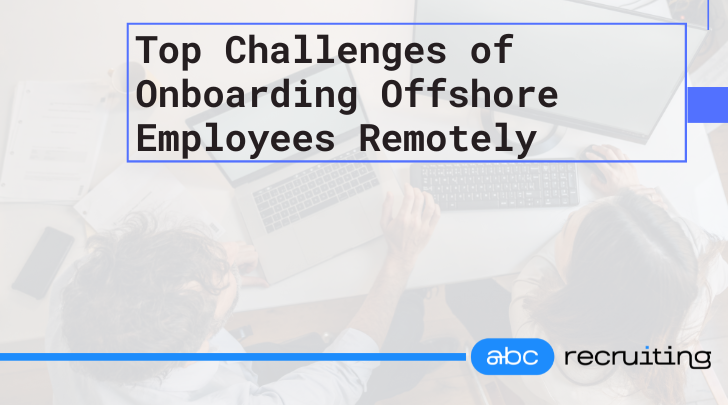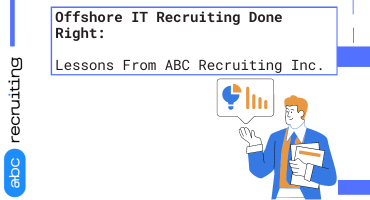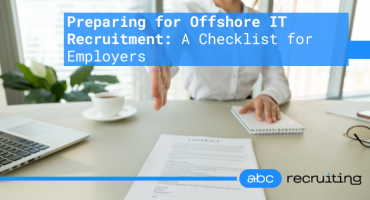Onboarding new hires is challenging enough, but doing so for a remote team in a different country adds extra layers of complexity. How do you successfully onboard remote offshore new hires when you can't meet them in person? How do you convey your company culture and values? How do you properly train them on your systems and processes? It may seem daunting, but with the right strategies and tools, you can onboard your remote offshore IT team for success. In this article, we'll explore proven techniques for remote onboarding, from pre-hire preparation to 90-day check-ins and beyond. With a thoughtful approach, you can overcome geographical barriers and time zone challenges to build an engaged and productive remote team.
The Benefits of Remote Onboarding for Offshore IT Teams
One of the biggest benefits of remote onboarding for offshore IT teams is the ability to hire top talent regardless of location. By casting a wider net, you have access to a global pool of candidates and can find the best person for the job.
Remote onboarding also allows for a more diverse, inclusive team. You can hire people from a variety of backgrounds, cultures, and experiences. This diversity of thought often leads to more innovative solutions and better problem solving.
Cost Savings
Remote onboarding significantly reduces costs associated with relocation and office space. Employees can work from their existing locations using their own equipment. This allows companies to reallocate funds to other areas like improved benefits or training programs.
Increased Productivity
Studies show that remote employees tend to be more productive. Without long commutes and office distractions, people can focus better and avoid burnout. Remote work also often provides more flexibility and better work-life balance which leads to increased job satisfaction, motivation, and productivity.
Business Continuity
With a remote workforce, your business can continue operating even when local operations are disrupted. Remote employees are not tied to a physical office and can work from anywhere with an Internet connection. This built-in business continuity and disaster recovery plan gives remote companies a competitive advantage.
In summary, remote onboarding for offshore IT teams provides access to top talent, diversity, cost savings, increased productivity, and business continuity. By embracing virtual hiring and onboarding, companies can build a successful global workforce.
Top Challenges of Onboarding Offshore Employees Remotely
Onboarding new employees remotely comes with its challenges, especially when hiring offshore. Here are some of the top obstacles to be aware of:
Communication barriers
With teams spread across the globe, finding convenient times for live video calls can be tricky. Be prepared for potential language barriers as well, and avoid colloquialisms that won’t translate. Provide important documents, resources and training materials in the languages your teams understand best.
Technology issues
Even with a strong internet connection, virtual meetings don’t always go smoothly. Have a backup plan in place for when tech issues arise, and be patient if it takes time for some employees to become familiar with your company’s online tools and software.
Cultural differences
Recognize that workstyles, holidays and business etiquette may differ between countries and cultures. Make an effort to understand cultural norms and find compromises that respect everyone’s needs. For example, avoid scheduling important meetings during major holidays or festivals in different regions.
Read more - Common Questions Around Cultural Barriers
Isolation
Starting a new job remotely can feel isolating, especially for offshore hires joining a foreign company. Go the extra mile to make new team members feel welcomed and included. Schedule regular one-on-one video calls, encourage coworkers to reach out and start building those relationships, even from a distance.
With the right strategies and sensitive, inclusive policies in place, the challenges of remote onboarding for offshore teams can absolutely be overcome. Focus on open communication, cross-cultural understanding and human connection - your new hires will thrive, no matter the physical distance.
Strategies for Virtually Onboarding Offshore IT Staff
Effectively onboarding new offshore IT staff virtually requires strategic planning and execution. Some key strategies to consider:
Provide a comprehensive onboarding program
Develop a structured onboarding program that covers all aspects of the role, team, business, and technology. Share documentation, videos, and presentations to give context. Set clear goals and timelines for new hires to achieve, with regular check-ins. A well-designed program will get them up to speed quickly despite being remote.
Assign a dedicated onboarding buddy
Pair new offshore staff with an onboarding buddy—someone in a similar role who can offer guidance and support. The buddy can help answer questions, provide job shadowing, and give feedback. This connection will help the new hire feel integrated into the team and company culture from afar.
Schedule frequent virtual meetings
Schedule frequent video calls, especially in the first few weeks. Meet with managers, teammates, and key stakeholders. This face time is critical for building rapport, sharing information, and ensuring the new staff feel engaged and part of the team. Ask open-ended questions to spur discussion and see if there are any issues to address.
Set clear communication expectations
Establish clear rules of engagement for communication, availability, and response times. For example, mandate that all team members check Skype or Slack for messages within a certain timeframe. This avoids confusion and ensures important information is received and acted upon in a timely manner. Provide the technical tools and accounts needed to collaborate effectively.
Conduct new hire surveys
Survey new offshore IT staff regularly to gain feedback on their onboarding experience and make improvements. Ask what's working well and what could be better. Look for any signs of frustration or disengagement and take action quickly. Their input will help strengthen your virtual onboarding program and process for future new hires.
With the right strategies and focus, you can onboard new offshore talent remotely and enable them to become fully productive members of your team. Consistency, clarity and connection are key. Keep an open mind for ways to improve the experience for new staff and your entire organization.
Ready to revolutionize your workforce with remote talent? Don't hesitate to get in touch with us and open the door to a new era of possibilities!




